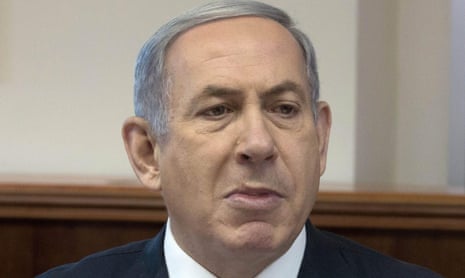Israel and key international supporters have sharply ratcheted up their campaign against the Palestinian-led Boycott Divestment and Sanctions (BDS) movement, with senior Israeli officials declaring it a strategic threat.
Using language the Israeli government usually reserves for the likes of Hamas or Iran’s nuclear programme, senior figures – including the prime minister, Binyamin Netanyahu, and a key backer in the US, casino magnate Sheldon Adelson – have turned on the movement, which is prominent on university campuses and among international trade unions.
The moves came as the UK’s National Union of Students (NUS) voted on Tuesday to formally ally itself with the aims of BDS. Following the vote, Hebrew media reported that Israeli MPs were due to hold a special session in the Knesset to discuss the issue.
The non-violent grassroots movement, founded with the support of dozens of Palestinian organisations, is modelled on South African anti-apartheid campaigns and calls for an end to the occupation, equality for Palestinian citizens of Israel, and a resolution for Palestinian refugees of 1948.
Israeli critics point to the call for a right to return and the opposition of some leaders of the movement to a two-state solution – which they describe as a mistake – as evidence that BDS is antisemitic.
After years in which Israeli officials and commentators have loftily dismissed the impact of BDS – which seeks to persuade businesses, artists, governments and academic institutions to boycott Israel over its long occupation of the Palestinian territories – Israel’s new rightwing government has in recent days singled out the movement for criticism.
The issue appears to have been given added impetus since Palestinian efforts to have Israel suspended from the scandal-ridden world football organisation Fifa failed on Friday.
Comments by senior Israeli politicians over the last week have been amplified in the Hebrew media by sympathetic commentary by columnists. Among those who have allied themselves with the latest efforts are the mass circulation Israeli paper Yedioth Ahoronoth – which earlier this week allied itself on its front page with “Fighting the boycott” – and its rightwing columnist Ben-Dror Yemeni, who has echoed the comments of officials.
“The success of BDS,” Yemini wrote earlier this week, “is particularly impressive because it is a movement that uses the language of rights, but deals in practice with denying Israel’s right to exist. The result is a major deception.”
The latest rhetoric has coincided with growing evidence of pro-Israeli activism over BDS, not least in the US. Last week, a new website emerged whose aim was to identify US college students active in the BDS movement with the explicit aim of identifying then to future possible employers. It was not clear who was behind the site.
This weekend, Adelson will reportedly convene a meeting of super wealthy pro-Israel donors for a summit in Las Vegas on countering the influence of BDS and similar movements on US campuses.
On Sunday, Netanyahu explicitly attempted to link boycott movements to historic “anti-semitism”, echoing remarks that Netanyahu made in his keynote address to the US pro-Israel lobby group AIPAC last year, when he described BDS as being on the “wrong side of the moral divide” while predicting that the “movement will fail”.
The latest rhetoric was immediately condemned by Barghouti, who dismissed the recent moves as a “panic-driven, racist and patently propagandistic Israeli attack on the movement”.
He told the Guardian: “Placing a non-violent human rights movement that seeks freedom, justice and equality on par with the so-called Iranian ‘nuclear capacity’ as a ‘first-rate strategic threat’ – as Israeli president Reuven Rivlin announced a few days ago or as the new minister of strategic affairs and public security in the far-right Israeli government Gilad Erdan tweeted on his first day on the job – reflects Israel’s failure in hindering the fast growth of BDS.
“It also betrays Israel’s inherent inability to face such popular, anti-racist, human rights-based and nonviolent challenges to its regime of oppression.”
Israeli officials told the Guardian that the focus on BDS was not an acknowledgement of its success but rather the reaffirmation of a principal of “moral outrage” both over the recent move by the NUS and by efforts to have Israel suspended from Fifa.
That, however, has led to accusations from critics that Israel is deliberately conflating the BDS movement with separate Palestinian efforts to hold Israel accountable for the occupation.
Facing growing warnings of international isolation in the absence of a peace process with the Palestinians and amid continued settlement building in the occupied territories, the latest moves appear designed to conflate BDS with separate initiatives by Palestinian diplomats to internationalise support for the end to occupation and for the creation of a Palestinian state in global forums.
One Palestinian official familiar with efforts on the international stage said he believed the latest effort was aimed not only at BDS but at the wider Palestinian effort to promote its case in the international criminal Court, the UN and Fifa.
“They are trying to combine all the efforts to hold Israel accountable into creating a monster that is not there yet,” the official said. “If ask the Palestinian leadership, some love BDS as a movement, others hate it. I think what Netanyahu is trying to do is create an idea that even if you believe Palestinian moves in international forums are legitimate, they are undermined because BDS – in the Israelis argument - seeks to ’destroy state of Israel’.”
